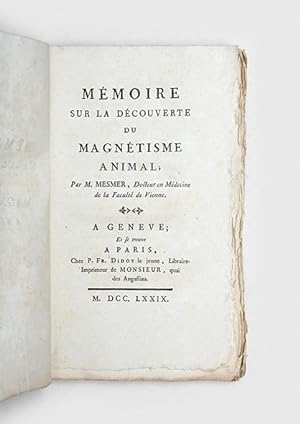A propos de cet article
First edition of the definitive exposition of animal magnetism; a beautiful copy in contemporary wrappers. The hugely influential theory of mesmerism, named after the author, pioneered psychotherapeutic techniques and led to innovations in the scientific method. It "became such a popular health care sensation in France that it was as much a social movement as a medical practice" (Garrison & Morton). Building on earlier ephemeral publications such as his Letter on Magnetic Treatment (1775), this book is Mesmer's first complete elucidation of his theory of animal magnetism. Mesmer (1734-1815) claimed that he had discovered the existence of a "universal fluid" that responded to magnetic forces and could be manipulated within patients to cure illness. The fluid could be transmitted inside people, animals, and objects, first through magnets and later through sheer will, solely by pointing at them. The theory, although pervasive, was controversial; despite his patrons including famous figures such as Marie Antoinette, his detractors condemned him as merely a theatrical showman. Mesmer's medical practice was elaborately choreographed and consisted of receiving patients in dimly lit, fragranced chambers whilst clad in extravagant robes. He was forced from Austria due to opposition from the Viennese Medical Faculty, leading him to settle in Paris, where the present volume was distributed. To investigate the veracity of mesmerism further, Louis XVI established the "Royal Commission on Animal Magnetism" in 1784. Members included Benjamin Franklin, Joseph-Ignace Guillotin, and Antoine Lavoisier. Franklin's investigations for the commission were early examples of controlled trials and are among the first examples of blind experiments; indeed, Franklin employed the use of actual blindfolds. The Commission found that there was no physical evidence of Mesmer's magnetic fluid, and noted that all of the supposed effects on the patients could have been achieved through suggestibility and imagination. Consequently, mesmerism became a catalyst for early psychoanalytic theory. "Suggestibility on the part of the patient can, without question, be the key to his recovery; and having found this out Mesmer became, unwittingly, a pioneer of psychotherapy. Since his time, the investigation of how to release subconscious states through auto- and hetero-suggestion has continued, and the whole field of extra-sensory perception and spiritualism has affinity with mesmerism" (PMM). Mesmerism also became closely linked to hypnotism; the Scottish doctor James Braid proposed the term hypnotism for his technique derived from Mesmer's theory, leading to the approximate equivalence between the synonyms "hypnotise" and "mesmerise" today. Even though the scientific basis of mesmerism was flawed, it achieved significant influence in the political sphere. Reactionaries and radicals alike considered it a dangerous contributor to the political crises of the late 18th century, associating it with mind control. For the reactionaries, "animal magnetism was inextricably linked in most British minds with France and its revolution. many of Pitt's supporters viewed it as part of a revolutionary conspiracy that Britain must fight" (Fulford, pp. 57-8). Inversely, the same label was applied to Pitt himself by the radicals. Samuel Taylor Coleridge described Pitt as "the great political Animal Magnetist [who] has most foully worked on the diseased fancy of Englishmen [and] thrown the nation into a feverish slumber" (ibid.). The theory of animal magnetism remained a pervasive presence throughout the cultural consciousness of the 19th century, influencing authors such as Poe, Dickens, and Browning. Crabtree 10; Garrison & Morton 4992.1; Heirs of Hippocrates 637; Printing and the Mind of Man 225; Waller 6505. Tim Fulford, "Conducting the Vital Fluid: The Politics and Poetics of Mesmerism in the 1790s", Studies in Romanticism, vol. 43, no. 1, Spring 2004. Octavo (180 x 118 mm). Woodcut ta. N° de réf. du vendeur 164337
Contacter le vendeur
Signaler cet article
Détails bibliographiques
Titre : Mémoire sur la découverte du magnétisme ...
Éditeur : Geneva: et se trouve à Paris, chez P. Fr. Didot le jeune, Libraire-Imprimeur de Monsieur, 1779
Edition : Edition originale
![]()




